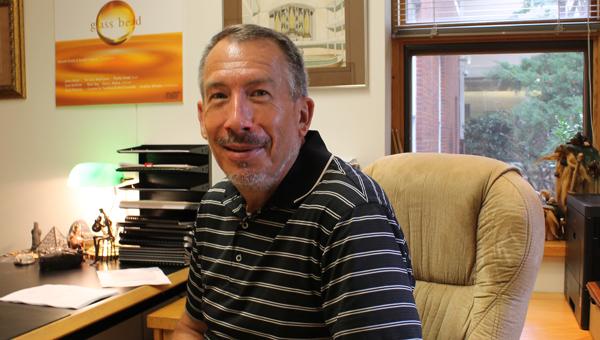Snead attends to the logistical side of the School of Music while teaching a class on applied horn and brass pedagogy.
“Brass pedagogy is basically all the elements of how to play brass instruments correctly,” Snead said. “Which could range from brass literature to concepts of how to deal with mouthpieces and instruments and embouchure formation and correct aspects of performance.”
The Alexandria Symphony in Alexandria, Egypt, The Tuscaloosa Symphony and The British Horn Society have all featured Snead in their ensembles. Snead has recorded with the TransAtlantic Horn Quartet, the Kentuckian Brass, Percussion Ensemble and more. He credits being able to manage his responsibilities at the University with his own career to time management skills.
“Time management is always imperative. Most of my days start at about 6 a.m., where I have to do my own warm up and practice on my own horn. I frequently start my teaching day with my horn students as early as 7 a.m.,” Snead said. “By the time I finish with all my duties as the director of the School of Music, all my teaching ?responsibilities, and any concerts that might occur in the evening, my individual practice day usually wraps up somewhere between ?10 p.m. and midnight every day.”
The work ethic and personality he brings to the table creates a friendly environment that is the same for both faculty and students, Kenneth Ozzello, director of The Million Dollar Band, said.
“He has kind of a dual reputation in that first, he teaches all the horn majors and that studio is absolutely internationally known for its quality and, in fact, attracts people from all over the world,” Ozzello said. “And there is his leadership track, where he’s the leader of the School of Music, and he’s built a reputation as kind of a general manager building a world class faculty.”
Martin King, a doctoral candidate and French horn musician, refers to Snead as the reason he came to the University for his graduate studies. He said Snead’s ability to relate to others along with his teaching style was a large factor in his decision.
“He’s the reason I’m here – his ?reputation as a teacher is the reason why I came down here to visit, and my visit is the reason why I came down here to school,” King said. “[Snead] has a reputation as someone who is somewhat of a straight shooter who will tell you the truth, and I believe that being here studying with him was the very best thing I could do for my career.”
He treats each person with the same amount of respect, whether they’re a freshman or a donor to the School of Music, King said.
For Snead, the main goal is simply to keep doing what he’s always done. He’s satisfied with the current state of the School of Music and is certain about the future.
“[I’d like] to continue doing everything I’m doing right now as well as I possibly can. I think the School of Music is in pretty good shape,” Snead said. “I’m confident about where we are as a school; we have a fabulous ?faculty and an ?absolutely terrific student body, so ?the School of Music is healthy and in ?a good place.”









